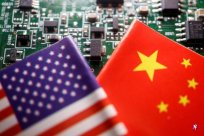(Beijing News) China wants to implement trade restrictions and other punitive measures to countries that violate their interests, but research shows that the Chinese government has poor results in this area.
The Wall Street Journal reported on the research report published by the Washington Think Tank Strategy and International Issues Research Center (CSIS) on Tuesday (March 21) that the Chinese government's measures in this regard are contrary to their wishes in some cases, but in the instead, some countries have prompted some countries to go towards some countries.The United States moves closer.
One of the authors of the research report, Matthew Reynolds researcher at the Strategic and International Issues Research Center, said: "China's coercion is not only invalid to a large extent, but it will also bring long -term strategic costs to China."
This study has inspected the situation that China has used coercion strategies in eight countries in Japan, Norway, the Philippines, Mongolia, South Korea, Australia, Canada, and Lithuania.Previously, the governments of these countries have adopted actions that are regarded by China as challenging their territorial claims, security, or other positions.
For example, in 2020 Australia called to conduct a traceability survey of crown diseases, causing dissatisfaction in China, and China subsequently imposed tariffs on Australian wine.
Studies have shown that although China's actions have painted some companies or industries in these countries, it turns out that the Chinese government has not successfully allowed the governments of these countries to change the policy of China, but instead adopt more tough countries to some countries.It provides a political excuse for the China route.
Research also shows that this kind of stress in China is lacking effective, partly because the Chinese government is unwilling to pay a price, and sometimes even abandon the high cost of coercion.For example, the Chinese government has recently canceled the ban on Australian coal from 2020, hoping to alleviate the high price of commodities, which is triggered by China's own restrictions to a certain extent.
Although the conclusion of this study believes that the effect of pressure in China is limited, the analysis and prediction of the Strategic and International Research Center, China will continue to use these strategies to achieve its own foreign policy goals."The risk of economic stress is low, which can be used to maintain its own influence and maintain its core interests on the international stage."



